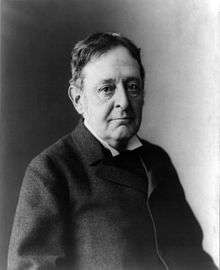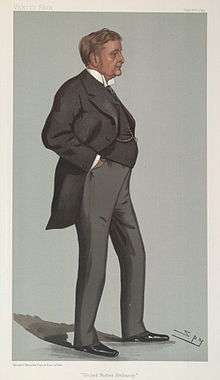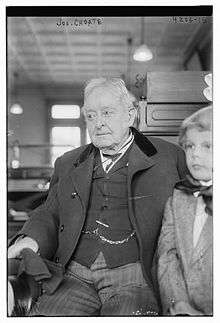Joseph Hodges Choate
| Joseph Hodges Choate | |
|---|---|
 Joseph Hodges Choate, 1898 | |
| United States Ambassador to the United Kingdom | |
|
In office March 6, 1899 – May 23, 1905 | |
| Monarch |
Victoria Edward VII |
| President |
William McKinley Theodore Roosevelt |
| Prime Minister |
The Marquess of Salisbury Arthur Balfour |
| Preceded by | John Hay |
| Succeeded by | Whitelaw Reid |
| Personal details | |
| Born |
January 24, 1832 Salem, Massachusetts |
| Died |
May 14, 1917 (aged 85) Manhattan, New York City |
| Resting place | Stockbridge Cemetery, Stockbridge, Berkshire Co., Massachusetts |
| Spouse(s) | Caroline Dutcher Sterling |
| Relatives |
George C. S. Choate (brother) Rufus Choate (first cousin once removed) |
| Alma mater | Harvard College, Harvard Law School |
| Profession | Politician, Diplomat |
| Signature |
|


Joseph Hodges Choate (January 24, 1832 – May 14, 1917) was an American lawyer and diplomat. Choate was associated with many of the most famous litigations in American legal history, including the Kansas prohibition cases, the Chinese exclusion cases, the Isaac H. Maynard election returns case, the Income Tax Suit, and the Samuel J. Tilden, Jane Stanford, and Alexander Turney Stewart will cases. In the public sphere, he was influential in the founding of the Metropolitan Museum of Art.[1]
Life and career
Choate was born in Salem, Massachusetts, on January 24, 1832. He was the son of Margaret Manning (Hodges) and physician George Choate, and the brother of physician George Cheyne Shattuck Choate. His father's first cousin was Rufus Choate. After graduating from Harvard College in 1852 and Harvard Law School in 1854, he was admitted first to the Massachusetts (1855) and then (1856) to the New York bar, and entered the law office of Scudder & Carter in New York City.
His success in his profession was immediate, and in 1860 he became junior partner in the firm of Evarts, Southmayd & Choate, the senior partner in which was William M. Evarts. This firm and its successor, that of Evarts, Choate & Beaman, remained for many years among the leading law firms of New York and of the country, the activities of both being national rather than local.

On October 16, 1861, he married Caroline Dutcher Sterling.[2]
During these busy years, Choate was associated with many of the most famous legal cases in American legal history, including the Tilden, Alexander Turney Stewart, and Jane Stanford will cases, the Kansas prohibition cases, the Chinese exclusion cases, the Isaac H. Maynard election returns case, and the Income Tax Suit. In 1871 be became a member of the Committee of Seventy in New York City, which was instrumental in breaking up the Tweed Ring, and later assisted in the prosecution of the indicted officials. He served as president of the American Bar Association, the New York State Bar Association, and the New York City Bar Association. In the retrial of the General Fitz-John Porter case he obtained a reversal of the decision of the original court-martial.
His greatest reputation was won perhaps in cross-examination. In politics he allied himself with the Republican Party on its organization, being a frequent speaker in presidential campaigns, beginning with that of 1856. He never held political office, although he was a candidate for the Republican U.S. senatorial nomination for New York against Senator Thomas C. Platt in 1897. In 1894 he was president of the New York state constitutional convention.
He was appointed, by President McKinley, U.S. Ambassador to the United Kingdom to succeed John Hay in 1899, and remained in this position until the spring of 1905. In England he won great personal popularity, and accomplished much in fostering the good relations of the two great English-speaking powers. He was one of the representatives of the United States at the second Peace Congress at the Hague in 1907.
Upon the outbreak of the World War I, he ardently supported the cause of the Allies. He severely criticized President Wilson's hesitation to recommend America's immediate cooperation, but shortly before his death retracted his criticism. He was chairman of the mayor's committee in New York for entertaining the British and French commissions in 1917. His death was hastened by the physical strain of his constant activities in this connection.
Choate died on May 14, 1917, in Manhattan.[3] He was interred in the family mausoleum at Woodlawn Cemetery in The Bronx, New York City, but was subsequently later buried in the Stockbridge Cemetery, Stockbridge, Massachusetts, near Naumkeag, his family summer house.
Works
- Abraham Lincoln and Other Addresses in England (1910)
- American Addresses (1911)
Legacy
He was awarded an honorary doctorate (LL.D.) by the University of Edinburgh in March 1900,[4] another LL.D. from Yale University in October 1901, during celebrations for the bicentenary of the university,[5] and an honorary doctorate (D.C.L.) by the University of Oxford in June 1902.[6]
In 1919, two years after his death, members of the Harvard Club of New York City established the Joseph Hodges Choate Memorial Fellowship at Harvard University to commemorate his life and legacy. It is awarded each year to a student from the University of Cambridge on the recommendation of the Cambridge Vice-Chancellor for study in any Department of Harvard University. The Fellow resides in the Choate Suite in John Winthrop House and his or her name is recorded on a board in the House Dining Hall.
Several of Choate's notable public addresses have been published. The Choate Story Book (1903) contains a few of his addresses and after-dinner speeches, and is prefaced by a brief biographical sketch. His country house, Naumkeag, was designed by Stanford White and is open to the public as a nonprofit museum in Stockbridge, Massachusetts.
His great-great-grandson is actor Oliver Platt.
Notes
- ↑ "Address of Joseph H. Choate: At the Opening of the Museum Building March 30, 1880". The Metropolitan Museum of Art Bulletin. 12 (6): 126. 1917. doi:10.2307/3253830. JSTOR 3253830. "To him in large degree the Museum owes the breadth of its original scope, embracing all arts and embracing art in its relation to education and practical life as well as to the enjoyment of the beautiful."
- ↑ "Joseph H. Choate, 80, Married 50 Years. Celebrates Golden Wedding with Mrs. Choate and Relatives at Naumkeag in Berkshires" (PDF). New York Times. 1911-10-16. Retrieved 2008-12-17.
- ↑ "Joseph Hodges Choate Dies Suddenly". New York Times. May 15, 1917. Retrieved 2009-02-16.
Joseph H. Choate died suddenly late last night at his residence, 8 East Sixtythird Street, of a heart attack. He had complained of feeling ill during the day and had retired early, but there was no physician with him when the end came. He breathed his last at 11:30. Mrs. Choate and their daughter, Miss Mabel, were at his side.
- ↑ "University intelligence". The Times (36080). London. 3 March 1900. p. 8.
- ↑ "United States". The Times (36594). London. 24 October 1901. p. 3.
- ↑ "University intelligence". The Times (36788). London. 7 June 1902. p. 9.
References



External links


- Works by Joseph Hodges Choate at Project Gutenberg
- Works by or about Joseph Hodges Choate at Internet Archive
| Diplomatic posts | ||
|---|---|---|
| Preceded by John Hay |
U.S. Ambassador to the United Kingdom 1899–1905 |
Succeeded by Whitelaw Reid |